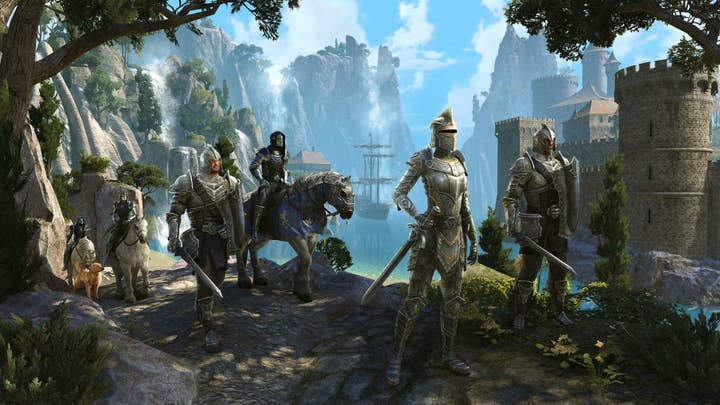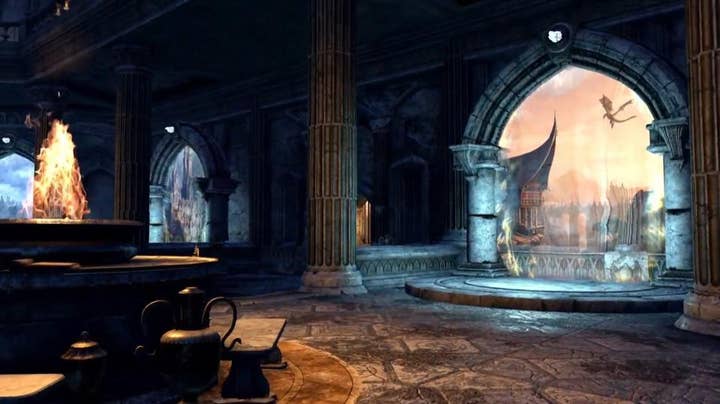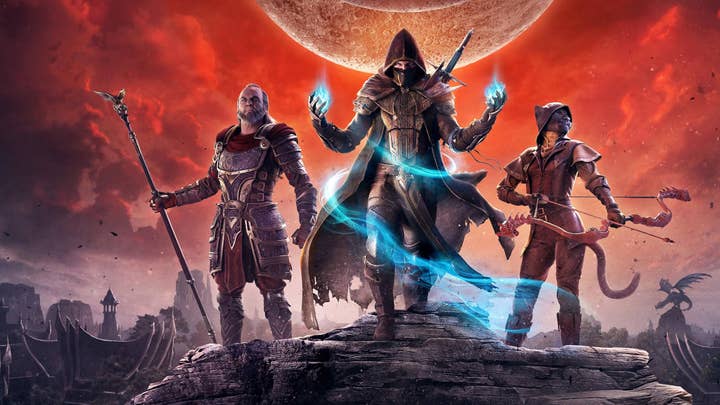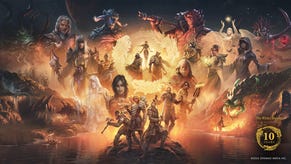Making an MMO for solo players in The Elder Scrolls Online
ZeniMax Online's creative director Rich Lambert talks us eight years of trying to appeal to both longtime series fans and ravenous MMO veterans
Since 1994's Arena – and particularly since 2002's Morrowind – the Elder Scrolls IP has been synonymous with vast open-world single-player RPGs where fantasy fans can lose themselves in a mix of epic main quests, exploration and an abundance of side content.
But how does that translate to an MMO, where each hero is surrounded by potentially millions of other similarly epic heroes?
"That's the hard part – most Elder Scrolls fans don't want other players in their game," Rich Lambert, ZeniMax Online's creative director for The Elder Scrolls Online, tells GamesIndustry.biz.

"We got a lot of that feedback early on – it's a 'I don't want chocolate in my peanut butter' kind of thing where people want to feel that they have direct influence over the world and that their choices matter. We learnt a lot about how to tell those kinds of stories. I think we found a really good balance; there are good choices for players to make, but at the same time, there are other players in your game so there are some things that you have to do."
He points to examples from the MMO's early days where hundreds of players would be trying to reach a major boss at the same time – something that "really turned some of the traditional Elder Scrolls fans off." Over time, ZeniMax Online developed new techniques and ways to layer what players could see.
"It's basically like your own private instance for that boss," Lambert explains. "That's where the single-player thing comes in; you go in, get your own encounter with that boss. You can invite other people to it, but nobody else can accidentally come in and take over and kind of ruin that experience for you."
"Most Elder Scrolls fans don't want other players in their game"
Another example he offers is the game's ability to hide NPCs. If you embark on a quest that involves killing a character in the world, that character will subsequently be hidden to you – but other players will be able to see them. Where necessary, the game will change the name or look of an NPC in a way that is consistent with both the game's structure and your own narrative.
"It ultimately comes down to doing as much as you can to make the player feel like they are special and that they're the only ones that are there, but they know there are other players around," Lambert says.
"Really early on, we tried to [make it so] the world actually changes, so you go in and save this village and then you go to that area and the village is saved and someone else comes in there and they're on basically a different layer and there's hostiles everywhere. That was really good for the world changing and the story changing aspects, but it destroyed players being able to play with other players because they were separated, so we had to find a balance there. I spent probably the first six months of launch fixing those types of issues.
"Ultimately the game is an MMO. You are supposed to develop those relationships. That's part of the magic; you find other people of like minds, you find guilds and you end up logging in to play with those people. The content is there and you can play it and enjoy it, but you really log in to talk to those people."

The balance the team needs to strike is making sure ESO offers something for everyone, whether it's a solo Elder Scrolls fan looking for an alternative to yet another Skyrim playthrough or a hardened MMO fan diving deeper and deeper into endgame content. Lambert says there is plenty for the former, and for the latter there's everything from bosses that require multiple players to take them down, to four-player dungeons, to 'Trials' and raids that support up to 12 people.
"The hardest part in all of that is trying to figure out the roadmap of things," he adds. "It's a persistent world so players are always in there; what other alternate activities that they're doing? The story only takes you so far. We launch a chapter that has 30 to 40 hours of content in it and hardcore players will polish that off in a week and they're like 'Give us more'. We can't build content fast enough. We have to have all those supporting systems on top."
"We tried to appeal to MMO players and Elder Scrolls players at the same time, to find that happy middle line, and we didn't"
To inform that roadmap, Lambert says ZeniMax has learned how to break down its player base into segmented cohorts when analysing their playing habits. For example, the team is able to compare the behaviour of players who predominantly spend time on PvP, solo PvE or group PvE activities. They then ensure there is new content for that group with every major update – of which there are four every year, amounting to about 60 hours of new content in total. Lambert previously admitted to us there has been some crunch involved in the past, but says processes have been improved and management expectations have been reined in to the point where this is less of an issue than it once was.
The ZeniMax teams also takes care to ensure ESO can still welcome new players, tweaking previous tutorials or creating brand new ones with every expansion. Lambert says the emphasis here is that, unlike some other MMOs, there's no need for new users to work through past content in the right order. Much like the single-player Elder Scrolls games, this is designed to allow players to simply choose a direction or quest line and see what they discover, with the MMO scaling the level of enemies to match your character.
"The big thing in ESO is it's more about the player's journey through the world rather than hitting some arbitrary level cap and then the game opening up and turning into a different game than the levelling experience," he explains. "That's our philosophy. It works really well.
"We have played a lot over the years with how we onboard players. We used to do a brand new tutorial for every new chapter which helped onboard you onto the chapter story, and then if you want to go outside the chapter, there are vectors to other zones. That worked pretty well. With the Blackwood chapter, we gamified it a little bit: you get a little bit of story as to who you are and what you're all about and then you're given a choice. You walk into this room full of portals and there's an NPC that talks to you about each of the stories that those portals take you to, then you could go and do that story."

The Elder Scrolls Online is now in its eighth year of operations, and even now the way forward is built on the foundations from earliest learnings – most notably, who the developers are trying to reach.
"We tried to appeal to MMO players and Elder Scrolls players at the same time at launch, so we tried to find that happy middle line and we didn't," says Lambert. "Neither really enjoyed it. There was a cool core game there and people liked it, but they didn't love it. We focused on this being an Elder Scrolls game first and foremost, and that really informed a lot of the decisions we made."
"We launch 40 hours of content and hardcore players polish that off in a week. We can't build content fast enough"
There's the added pressure of "carrying the torch" for the overall Elder Scrolls brand, as Lambert puts it. While Skyrim continues to be released on every new platform possible, ESO stands as the only new entry in the franchise since 2014, and while The Elder Scrolls 6 was announced in 2018, Bethesda's focus on Starfield makes it unlikely there will be updates on the forthcoming RPG in the near future. With Elder Scrolls fans chomping at the bit for new content, Lambert is confident his team can keep them satisfied.
"We're happy with what we do and most importantly, we have the full support of the Bethesda Game Studios team. Early on, there were some struggles and trust issues there – 'Who are these guys coming in to take over the IP?' and whatnot – but we have a great working relationship with them. We can sit down and talk about things and come to agreements. There's a lot of trust there."
The latest expansion, High Isle, launched in June and added the Systres Isles, a new archipelago never seen in any previous Elder Scrolls title. Lambert says the team is already hard at work on 2023 content, with plans for 2024 and concepts taking shape for the years beyond. It can take just over a year to build a new zone for The Elder Scrolls Online, but Lambert is confident it will see more expansions in the years to come.
"As long as there's people that want to play ESO, we're going to continue to support it."



